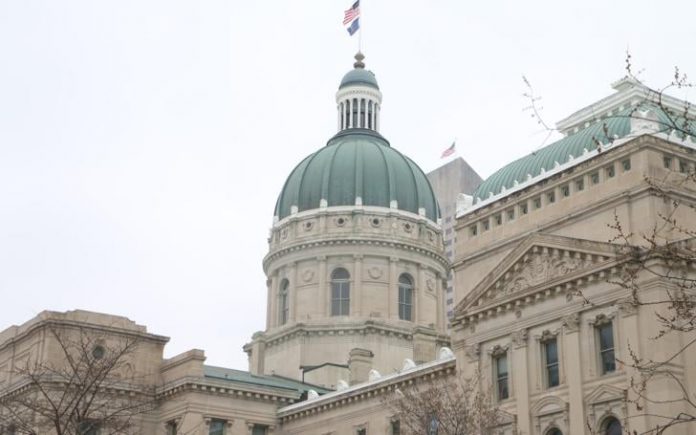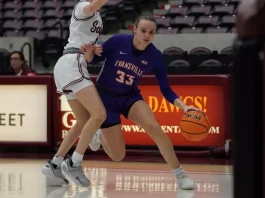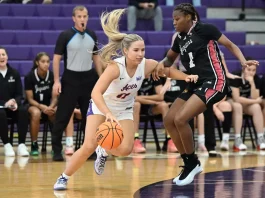-
Indiana Gov. Mike Braun has been signing into law a slew of bills changing voting and the administration of elections that passed through the legislature during the 2025 session even though the November 2024 election did not bring any claims of widespread voter fraud or concerns about ballot security.
Nearly 20 voting and election bills were filed in the Indiana Statehouse this year, and while two measures, described by voter rights’ groups as the most egregious, died in the legislature, others that landed on Braun’s desk, the groups say, will limit access to the ballot box. Among the new laws are those that will make school board elections partisan, prohibit students from using their college IDs as proof of identification when voting, require proof of citizenship from some naturalized citizens and allow more poll watchers at voting places.
Julia Vaughn, executive director of Common Cause Indiana, said in 31 years of lobbying for her organization at the Statehouse, she has never seen anything like this year’s flood of election-related bills.
“This is an assault on democracy,” Vaughn said.
In past legislative sessions, Vaughn said, one or two “bad bills” would be filed that took election policy backwards. This year, the General Assembly is acting with no reason or evidence of wrongdoing, she said. Language from statutes in other states, such as provisions about dating absentee ballots, have been inserted into some of the Indiana bills, while issues that have already been litigated, such as voter IDs, are reappearing, she said. The result is real consequences for Hoosiers going—or trying to go—to the polls.
“I wish legislators had to take a Hippocratic Oath like doctors (do) to do no harm because now what they’re doing is truly going to harm voters,” Vaughn said. “It’s making voting less accessible.”
Indiana is not an outlier. The Voting Rights Lab, a national nonpartisan organization promoting free and fair elections, is tracking 1,657 bills that are being considered in Statehouses across the country that will impact voters and the administrations of elections. State legislatures have “unrivaled power” to shape election policies, and state lawmakers around the nation are introducing and debating bills that could significantly alter voter behavior, according to the VRL.
Rep. Timothy Wesco, R-Osceola, chair of the House Elections and Apportionment Committee and author of several election-related bills, acknowledged the number of voter and voting bills filed this year was not spurred by any glitches or problems in the November 2024 election, saying Indiana “has been blessed” in that it has not had a lot of controversy about the outcomes of elections at the state and local levels.
Still, the Osecola Republican defended the voter and election legislation. He said they are part of Indiana’s effort, starting with former Secretary of State Connie Lawson, to keep elections as secure as possible and make sure voter registration rolls are accurate.
“We have many different county clerks and, I think, they all take an interest in seeing the election laws improved or glitches resolved or issues addressed in that respect,” Wesco said. “So we oftentimes get suggestions from our county clerks, individually or as a group, … that always results in a fair degree of legislation.”
Bringing ‘major consequences’ to future elections
According to its analysis, the Voting Rights Lab found that a majority of the voting and elections bills it is tracking, or 723 measures, would improve voter access or election administration. The remainder, 428 bills, would restrict access or administration.
The plethora of bills underscores the point made by Liz Avore, senior adviser at VRL. She said state legislatures have become the “major battleground” for shaping voting and election policies.
“Despite a secure and trusted election in November, some state lawmakers remain fixated on enacting highly disruptive changes to election law,” Avore said. “Like we saw after the 2020 election, many of these proposals are based solely on disinformation. What happens today has major consequences because the new laws written today will govern the 2026 and 2028 elections.”
In Indiana, a majority of the bills that have been signed into law are viewed as bad for Hoosier voters by voting rights advocacy groups. Indeed, Common Cause Indiana and the League of Women Voters of Indiana testified against several bills and rallied volunteers and supporters from around the state to call and to show up at the General Assembly to lobby their representatives and senators to oppose that legislation. Even as the session was winding down and election bills were getting passed, Common Cause was imploring Hoosiers to call the governor’s office in a last-ditch effort to derail some of the legislation.
The public outcry—along with the opposition from House Speaker Todd Huston, R-Fishers—has been credited with helping to stop two especially controversial bills. SB 201, which would have closed the state’s primaries by requiring primary voters to affiliate beforehand with a political party and then vote only on that party’s ballot, and SB 284, which would have cut the number of early voting days to 14, both stalled when they arrived in the House.
However, several other bills did survive the legislative process and got signed by Braun, despite fierce opposition, including:
- Senate Enrolled Act 10, which prohibits students from using their college IDs as their identification card to verify who they are when checking in to vote, requires county voter registration offices to confirm the status of voters who have not cast a ballot in the past two general elections and mandates the secretary of state try to execute agreements with other states to share voter registration information.
- Senate Enrolled Act 137, which requires the Indiana Bureau of Motor Vehicles to notify the Election Division of any individual who has temporary status registers to vote.
- Senate Enrolled Act 199, which simplifies the process to allow more poll watchers to be tapped for Election Day. Vaughn of Common Cause said the voting advocates are concerned the additional political personnel “will try to overstep what the law allows them to do and interfere in the administration of the election.”
- Senate Enrolled Act 287, which turns school board elections into partisan contests by requiring candidates to affiliate with a political party (Republican, Democrat or Independent) or chose to run as a nonpartisan.
- House Enrolled Act 1680, which requires county registration officials to request proof of citizenship from any individual who registers to vote using a temporary credential issued by the Indiana Bureau of Motor Vehicles.
Other measures, which Common Cause described as “pro-democracy bills,” did not even get a committee hearing. These include:
- Senate Bill 200, which would have eliminated straight ticket voting.
- Senate Bill 302, which would have allowed absentee ballots to be counted before the polls closed on Election Day.
- House Bill 1530, which would have permitted elderly, disabled and pregnant voters to go to the front of the line at polling places. Even though these three pieces of legislation were authored by Republicans, they went nowhere in the Statehouse.
Like many of his Democratic colleagues, Sen. J.D. Ford, D-Indianapolis, introduced election legislation during the 2025 session, but like all of the other election bills from his party, it did not gain any traction, which left him frustrated. His measure, SB 532, would have established a commission to review barcode technology that would enable voters and county clerks to track the whereabouts of absentee ballots in real time, the same way the U.S. Postal Service tracks mail and airlines track luggage.
“It is no different from me flying on Delta,” Ford said. “I can look at my app, I can see that my bag has been loaded (onto the plane), my bag has been offloaded, it’s on the carousel. I mean, I can track it through the entire process. Why can’t we do that with our ballots?”
Election security and ballot access concerns
One new election-related law, House Enrolled Act 1633, requires the Indiana secretary of state to do something the legislature has not done in seven years: study an election issue and submit a report. The new law calls upon the secretary of state to analyze the impact of moving municipal elections to presidential and non-presidential election years and of mandating all counties to use vote centers. Also, the law instructs three public hearings be held as part of the study.
Although the General Assembly has an interim study committee on elections, it has not been assigned any topics since 2017. The last time that interim committee did meet, it was tasked with studying how changes to Indiana election laws impacted voting in Indiana from 2000 through 2016. In its final report, the committee advised the state to continue to look for methods to keep an accurate and current voter registration list and to explore same-day voter registration as well as consider the public’s interest in voting by mail.
Wesco downplayed the interim elections committee inactivity, saying there have not been any significant issues to review. Lawmakers, he said, have been able to debate and vet the voting and elections bills that get filed during a legislative session.
“I feel that we have adequate time to sort through them and review them,” Wesco said. “I don’t really see any absolute benefit. It might be helpful in some context, but I can’t think of any examples.”
Regarding the new law banning the use of student IDs as voter identification, Sen. Blake Doriot, R-Goshen, said he authored and filed SB 10 after speaking to “concerned citizens,” which included people at universities. Colleges told him, he said, that they are not sure that they vet the students with enough rigor to verify citizenship status and residence when issuing the IDs.
“I’m all for trying to get more people to vote, but I don’t want people voting that shouldn’t be voting and I don’t want people voting in two places,” Doriot said. “You should claim a residence and be there and vote in that area.”
SEA 10 is now being challenged in federal court. Court US IN, Women4Change Indiana and a student at Indiana University–Bloomington filed a complaint seeking to block the state from enforcing the college ID ban. They are claiming the new law places “substantial, unjustified burdens” on young voters trying to vote, in violation of the First and 14th Amendments, and abridges young voters’ voting rights on the basis of their age, in violation of the 26th Amendment.
Ford said he is unsure why so many election-related bills were filed this past session, but he speculated that while some lawmakers across the aisle filed legislation under the guise of improving election integrity and security, their true intent was to strengthen the Republican supermajority in the Statehouse. The cumulative result is that all of these bills, he said, are “inching us closer and closer and closer” to voter suppression.
Consequently, Ford and his Democratic colleagues in the Senate and House resorted to offering multiple amendments to the Republican-authored bills. As an example, the Indianapolis senator and Democratic Reps. Sue Errington, of Muncie, and Pat Boy, of Michigan City, all offered amendments to SB 10 that would have stripped the prohibition against college IDs. The amendments all failed.
Ford said his strategy for the amendments was to keep Indiana’s elections safe and secure but also make voting easier for Hoosiers.
“I want to say that I join my colleagues in wanting safe and secure elections and in having good integrity for our elections because I think sometimes (Republicans) point to (Democrats) and say, ‘You guys don’t want that,’” Ford said. “I want that, but I also believe … that we can make it easier for voters to vote, and I don’t think that we do that.”
This article was published by TheStatehouseFile.com through a partnership with The Indiana Citizen, a nonpartisan, nonprofit platform dedicated to increasing the number of informed, engaged Hoosier citizens.
Indiana Citizen Editor Marilyn Odendahl has spent her journalism career writing for newspapers and magazines in Indiana and Kentucky. She has focused her reporting on business, the law and poverty issues.





More needs to be done than has been. Why do people complain about having to prove with no doubt that you’re a citizen? I’d prefer you also have to be a property owner and actually have a true tax liability. The rest don’t contribute to our society…..
Comments are closed.